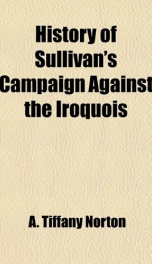history of sullivans campaign against the iroquois

Purchase of this book includes free trial access to www.million-books.com where you can read more than a million books for free. This is an OCR edition with typos. Excerpt from book: CHAPTER III. RETALIATORY MEASURES PROPOSED. The continued depredations of the Indians on the border settlements rendered imperative some decided measures to punish them, and prevent their further operations. It was long, however, before those in authority heard the urgent appeals of the settlers for protection and redress.'and longer still before those appeals were answered by positive action. It was at this time the darkest hour of the Revolution. The country was wearied by long years of warfare, and needed rest. The struggle had nearly exhausted the means and the patience of the people. The army suffered terribly for the want of proper food and clothing, and the most strenu- ' ous efforts to supply these wants met with little success. Evil seemed everywhere prevalent. The continental currency had become so depreciated that farmers refused to furnish supplies to the army and take their pay in it. The soldier's pay, measured in this currency, did not suffice to provide food for his suffering family, while it was often far in arrears, and his earnest appeals that justice might be done him awoke pity in the hearts of .those who could render no aid, but produced little effect on those whose official position made it their duty to care for him. Many were compelled to throw up their commissions that they might return to civil life and earn a support for themselves and families. A general feeling of apathy and indifference prevailed, and the leaders met with serious discouragements. Enlistments were few, and only high bounties would prevail on men to go into the army. These often deserted after months of toil and privation, because their complaints were not heeded, or utterly refused to do duty until their demands were conceded. Among the army officers jealousies and discords ...
Info about the book
Author:
Series:
Unknown
ISBN:
0822959445
Rating:
3/5 (1)Your rating:
0/5
Languge:
English
Users who have this book
Users who want this book
What readers are saying
What do you think? Write your own comment on this book!
write a commentif you like history of sullivans campaign against the iroquois try:
Other books by this author
Do you want to read a book that interests you? It’s EASY!
Create an account and send a request for reading to other users on the Webpage of the book!

